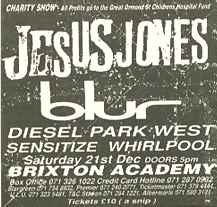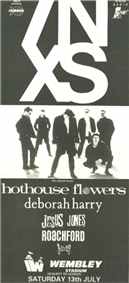
1991 Part Five
| Part One | Part Two | Part Three | Part Four |
INXS Support Date Advert & Band Pass - 13th July 1991
Questionnaire - Number One Magazine - July 1991
If they were making Jesus Jones - The Movie which actors would you want
to play yourselves?
Gen: Someone of comparable stature, like Harpo Marx! He's the silent one at
the back who's a bit strange - like me! Or maybe someone like Harold Lloyd or
Buster Keaton.
Iain: I'd go for Keanu Reeves. He's stupid but can also be cool like me! Haha!
Jerry: It'd be Rutger Hauer. He's cool, calculated, goodlooking and likes Guiness.
That sums me up!
Alan: Someone with a really good head of hair. Like Errol Flynn. He's all man!
Mike: I'd get Jerry to play me. That would be the most hilarious piece of miscasting
ever!
If you were murdered in sinister circumstances, who would you like to investigate
the crime?
Alan: It would have to be Columbo because he'd sort it out. He's the grooviest
detective of all time!
Gen: I'd go for him too! He's got some natty raincoats and a great car.
Iain: I'd get Chuck D! Instead of pussy-footing around he'd go up to people
and say: "Yo! You'd better tell me who killed him... or else!"
Mike: I'd get Inspector Clouseau, because he'd eventually get around to finding
out who did it and also have a lot of fun too!
Jerry: I'd get Hart To Hart! Wihtout a doubt! They're so wonderful, cuddly and
lovely and I'm sure they'd have great fun doing it!
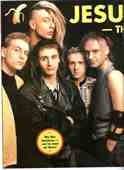 If somebody gave you a time machine where would you go?
If somebody gave you a time machine where would you go?
Mike: I'd like to see the Vikings invading Britain!
Iain: I'd just go back a couple of months with all the football scores from
one Saturday, fill in the Pools form, make loads of money and then just enjoy
the rest of my life!
Alan: I'd go back to Wembley in 1966 when England won the World Cup. I'd have
a bet on England anyway!
Gen: I'd like to go to ancient Egypt. Everyone says the Egyptians were influenced
by other worlds because of their incredibly superior technology. Or maybe I'd
visit the Aztecs in South America.
Who would you most like to beat in a game of croquet?
Mike: Saddam Hussein without a doubt. I think he'd be a great person to
beat at anything! But I'm sure he'd cheat!
Alan: It'd be Mike. I'd like to beat Mike at anything. I'd like to get one over
on him for once in my life!
Gen: I haven't played croquet for years. In fact the last time I played was
with my grandad. He always used to beat me so I think I owe him a big thrashing!
Which historical character would you most like to have a chinwag with?
Gen: Alfred The Great, because he's an all-conquering sort of dude like
ourselves. For a slightly different reason though - he went round killing people!
Was it Alfred who burnt the cakes? Well I'd give him some cookery tips then!
Iain: I'd love to meet John Betjamin, because he's my favourite poet and he
used to live near me. I'd go out for a ride on the tube with him down to Wembley
Park and then we'd wander round and chat about his poems!
Mike: I'd go and meet Jesus Christ without a doubt. I'd like to know if he's
man or myth!
Alan: I'd go for Charles Darwin, because he completely blew things out of the
water. I'd like to find out how much stick he got from the church and stuff!
Why are oranges not the only fruit?
Mike: Because there is choice in the world and you are free to make your
own choices.
Iain: Because there's always a different way and there's always something
else that is new and exciting.
Gen: It would be pretty boring if they were because we like bananas -
we're mad on them!
Alan: And they're a better shape anyway!
August 1991 Spiral Scratch Magazine Feature
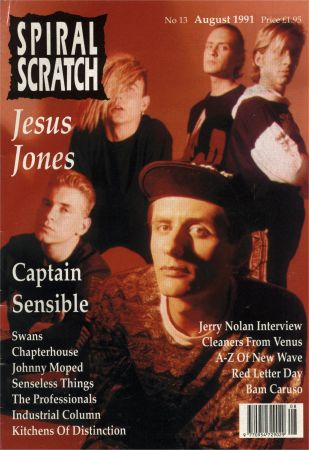 Alexander of Greece, Napoleon of France, Mountbatten of Burma...to this hallowed roll let there be added a further name: Mike Edwards of Jesus Jones. Since 1988, his campaign to assault the ears and charts of the Western World has taken many a turn but this leader of (five) men has consistently charged into battle riding at the front. Enough! Why is it that music journalists always feel it necessary to display their wit and wisdom with dodgy syntax and mixed metaphor? Who knows? Who cares? Yet there remains an element of truth to all this military maneuvering. Edwards is not only the band's lead singer, songwriter and spokesman but is also responsible for production, publicity and sleeve design. A self-confessed control freak, it comes as little surprise that he has not just read but devoured Machiavelli's The Prince, and believes that the end justifies the means. So far the battle honours have been his although the war to "change the course of rock music" and have people "change their ideas about music" has yet to be won.
Alexander of Greece, Napoleon of France, Mountbatten of Burma...to this hallowed roll let there be added a further name: Mike Edwards of Jesus Jones. Since 1988, his campaign to assault the ears and charts of the Western World has taken many a turn but this leader of (five) men has consistently charged into battle riding at the front. Enough! Why is it that music journalists always feel it necessary to display their wit and wisdom with dodgy syntax and mixed metaphor? Who knows? Who cares? Yet there remains an element of truth to all this military maneuvering. Edwards is not only the band's lead singer, songwriter and spokesman but is also responsible for production, publicity and sleeve design. A self-confessed control freak, it comes as little surprise that he has not just read but devoured Machiavelli's The Prince, and believes that the end justifies the means. So far the battle honours have been his although the war to "change the course of rock music" and have people "change their ideas about music" has yet to be won.
After three moderately successful chart skirmishes, including the critically acclaimed debut single Info Freako, described as "brilliant...a sticky, sneering slice of megalomania" (Sounds, Feb 18 1989), and a somewhat overstretched but still respectable first album Liquidizer - Top 5 in the US alternative charts and going silver here - the conflict was joined in earnest with their second album Doubt going to number one in the UK and achieving gold status. At the timer of writing, the single Right Here Right Now is ensconced at number 8 in the TV charts. The Jesus Jones Army is steadily advancing.
Given the dominance of Mike Edwards over almost every aspect of the band's activities, it is tempting to see the rest of Jesus Jones as little more than humble foot soldiers. However, even foot soldiers get mentioned in dispatches. So lest we forget, they are Gen (drums: aka The Human Pellet, aka Simon Matthews); Al Jaworski (bass: aka Tagnut The Bold, aka Mister English); and Iain Baker (keyboards/samples: aka Eggy McChet, aka Barry D, aka Barry Dogg, Barry A God, etc...) More about these aliases later.
Edwards would appear to be a natural frontman. Photogenic and intelligent, he gives good interviews whether playing it courteous or obnoxious and his is the vision most clearly stamped across Jesus Jones' product. Yet this tendency
towards control extends beyond simple artistic policy. A perfectionist himself, he demands the same discipline from his troops: "The first time you see a member of Jesus Jones drunk on stage will be the very last time you see that member on stage". This power to hire and fire on his terms further adds to the impression that the rest of the band are superfluous, playing by Edwards' numbers and the prospect of a solo project certainly has been mooted but seems unlikely for now. The band claim that without them, Edwards' work would simply be humourless and mechanical, and the fact that their near-flawness recorded efforts have yet to create the energy and excitement of Jesus Jones playing live seems to bear this out. The calculation and discipline of Edwards is at once the band's great strength and its weakness, for while he claims to be simply being practical and honest about matters - "Most bands have a very strong leader...a lot of people suffer this hangover from punk: this idea of democracy which bands believe works and I know for a fact that it doesn't". - and is backed by manager Gail Coulson: "In all the bands that have lasted a long time, one person has always come out", the fact remains that the whole of a band must be greater than the sum of its parts. Otherwise, why not go solo? The success of REM's democratic approach to their music is all to evident to ignore, while the most lasting work of The Beatles and the Rolling Stones were the results of group effort, the strengths of some compensating for the weaknesses of others. While it is true that someone has to take the final decisions and Edwards' instincts are clearly sound - such perfectionism denies emotion and spontaneity, lessening Jesus Jones' impact.
It would also appear to have created some dissension among the lower ranks. So far, there will have been little in this article to please Iain Baker, tired of the emphasis on Edwards' individuality. In Belfast, he commented: "It's so obviously an inadequacy...Mike would like to think he's giving away a lot in his songs through his soul-searching, but I don't think some of the deepest things he feels will ever come out...there's no humanity in what he's does". Such critical concerns apart, there can be no denying that the success of Jesus Jones is in part due to Edwards' single-mindedness, which in turn is due to his past experiences with bands. Any aspiring rock star can testify to endless hours waiting for petulant drummers and highly-medicated guitarists to grace them with their presence: "I could see a load of people messing about not getting things done. Eventually I thought 'Sod this, I'm taking control'..control is most important if I am going to achieve what I want".
Which brings this article neatly to Jesus Jones' initial recruitment, and a handy tip gleaned from the Bumper Boys' Book Of Journalist Cliches. "Should you find your extended metaphor losing it's elasticity reinforce it with the weak link taken from the subject's past". In this case, the link is Camouflage. It was under this name in 1986 that Edwards, Gen and Al Jaworski moved from Bradford-Upon-Avon, Wiltshire, to London where a constant round of gigs and demos met with little response. The same was true of their later incarnation as the three-piece Big Colour, and it was not until the summer of 1988, on a holiday in Spain, that the identity and policy of Jesus Jones - combining dance and rock influences in to one package, use of samples, etc. - came into being. On their return to England, Baker and Jerry de Abela Borg were drafted and the band sought both an image and a record deal. They didn't have long to wait. Iain Baker was able to arange a discount from Slam City Skates, where he was manager, and so the 'skatepunk' image was born. At about the same time Jesus Jones recorded their first demo tape for £125. This turned out to be money well spent for Info Freako/Broken Bones/What's Going On led Andy Ross of EMI's independent label Food Records to sign the band almost straightaway and later comment that Jesus Jones were going to make him a millionaire. Infor Freako was released, unchanged from its demo version, in February 1989 and a crashing wall of guitar and sample sound assaulted the airwaves as the single reached Radio One daytime airplay amd the lower reaches of the Top 50, peaking at number 42. It was an impressive debut, almost too impressive.
For the next eight months, any further Jesus Jones release would suffer from comparisons with Info Freako while the band themselves were seen as "the next (insert appropriate name here)" by the label-loving members of the music press (another cat out of the bag!). Mike Edwards and Jesus Jones refused to be categorised, realising they had hit upon something unique and timely, and instead re-invented themselves in their 'skatepunk' images. Thus the first set of aliases. Edwards went further and adopted the character of Jesus H. Jones, arrogant and contemptuous. Perhaps with good reason, for the success of Info Freako reinforced his policy of control, having been produced by him. As he later remarked: "The way we got successful with the first demo is because I said, 'Look, let me organise how we're gonna do this tape, let me organise the production of it totally. I'll do it and I'll make sure it's successful!' And it worked, thank God!". An early interview with Sounds finds him posing in Slam City regalia, leather jacket with badge exclaiming 'Hype' and a black cap "tilted at the kind of precocious angle that bedroom revolutionaries fantasize about". His tongue planted firmly to one side of his teeth, he equates ambition with credit accounts at Woolworths and talks about sacrificing the band to achieve his goal: "Basically, what I'm after is fame". Doubtless this was all good knockabout stuff, but it reveals early on the measure of calculation in Edwards' work. The decision to play a maximum eight song, 25 minute set when supporting The Shamen was as deliberately designed to draw attention to the band as the Iain Baker pseudonym "Barry A (for Arsehole) God".
Such arrogance is not without its rewards, and Jesus Jones received the publicity they desired. Having got the ball, they proceeded to run with it. Their second single, Never Enough (June '89) was dramatically different from Info Freako and the conscious decision to change tack when least expected is another constant in the band's campaign, perhaps based on the fact that it is harder to shoot a moving target. Ironically, the single reached the same number 42 slot as its predecessor. Bring It On Down (September '89) likewise entered the lower reaches of the Top 50 and heralded the arrival of the band's first album, Liquidizer, the following month.
Curiously, Edwards relinquished production of Liquidizer to Craig Leon, whose past credits included Blondie and The Primitives, and it is arguable that the lack of a single direction within the album is due to this move. Critics complained that it suffered from containing too much at once, with the standard comparison to the initial impact of Info Freako, and "impenetrable" became the favourite adjective in reviews. As mentioned before, the sales of Liquidiser seemed to counter the reservations of the music press and the end of 1989 saw them appearing on The Food Christmas EP, covering Crazyhead's I Don't Want That Kind Of Love, as well as being among the top five 'Best New Bands Of The Year' as voted by the readers of Sounds, NME and Melody Maker. The army was growing.
The first half of 1990 seemed to mark a lull in the campaign, with just the one single, Real Real Real (February '90), being released. In fact, the band was gearing itself for a global assault, with small tours of the US, Canada, and Japan. Real Real Real can be seen in retrospect as a taste of things to come, establishing the band's presence in the Top Twenty (it peaked at number 19). But while the band's away...
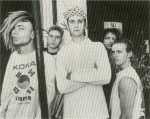 In the meantime, EMF were making a name for themselves. Clearly influenced by Jesus Jones, they too adopted the rock-dance crossover stance and a 'skatepunk' image for their first major single, Unbelieveable, and came to prominence between the releases of Right Here, Right Now (September) and International Bright Young Thing (December). The press finally had a label - albeit artificial - with which to define the band and a 'phony war' was declared between Jesus Jones and EMF. In fact, the comparisons seem to have done nothing but good for the Edwards Battalion. It takes vision to develop a style, but it takes others to turn it into a trend. The success of Unbelievable meant that Jesus Jones' look and sound had become high fashion rather than underground and must have bolstered International Bright Young Thing's performance, as it climbed to Number 7 in comparison with Right Here, Right Now's lowly number 31. With it's raga-style harmonies, reminiscent of Revolver-era Beatles thrust against a mix of dance rhythms and power-pop chords, the song was a potent rallying cry at a time when dance and psychedelia were at their height.
In the meantime, EMF were making a name for themselves. Clearly influenced by Jesus Jones, they too adopted the rock-dance crossover stance and a 'skatepunk' image for their first major single, Unbelieveable, and came to prominence between the releases of Right Here, Right Now (September) and International Bright Young Thing (December). The press finally had a label - albeit artificial - with which to define the band and a 'phony war' was declared between Jesus Jones and EMF. In fact, the comparisons seem to have done nothing but good for the Edwards Battalion. It takes vision to develop a style, but it takes others to turn it into a trend. The success of Unbelievable meant that Jesus Jones' look and sound had become high fashion rather than underground and must have bolstered International Bright Young Thing's performance, as it climbed to Number 7 in comparison with Right Here, Right Now's lowly number 31. With it's raga-style harmonies, reminiscent of Revolver-era Beatles thrust against a mix of dance rhythms and power-pop chords, the song was a potent rallying cry at a time when dance and psychedelia were at their height.
The army had reached the front line, and in recognition of this EMI/Food released their second album, Doubt, simultaneously across the world in January of this year. Once again, Mike Edwards was at the producer's desk and Doubt entered the album charts at number one in this country. It simplified the musical blends of Liquidizer and as a result became more and more accessible. Equally accessible was the next single Who? Where? Why?, which captilised on the success of the album as well as highlighting the band's extensive UK tour in February. By now the band's attitude to live performance had softened and Jesus Jones playing a driving, meticulously paced set of 21 songs, plus encores. Edwards' grip on the band remained firm as ever and an NME review of two consecutive dates in Leeds and Manchester has him orchestrating a football-style inquest into a missed note in Leeds and checking for barely audible mistakes on the playback as the tour bus careered across the Pennines. Who? Where? Why? finally peaked at number 21 and so far there has been no further vinyl offering from Jesus Jones with the exception of a re-released Right Here, Right Now (July '91) to capatilise on the single's belated international success.
Collectors of Jesus Jones' back catalogue may find themselves jumping on to the bandwagon a little too late. Until late 1990, many of the previous releases could be found lingering in bargain baskets across the country. However, the popularity of their more recent offerings has led to the forces of economics demonstrating their powers: more demand, less supply, and higher prices. Info Freako has long-since been deleted, although it can be found on the flip side of the re-released Right Here, Right Now, as have Never Enough, Bring It On Down and The Food Christmas EP. Meanwhile the band has produced different mixes on virtually every separate format, meaning that virtually all the formats have to be purchased if a comprehensive collection is to be built. In the case of Real Real Real, the completist's task may seem almost impossible, with seven different formats and two 12" promos on offer, all becoming increasingly rare. Of special interest to the die-hard collector are a 7" 'Skateboard sticker' package for Never Enough, a 10" boxed set with colour supplement for Right Here, Right Now, and a 12" picture disc version of International Bright Young Thing. Promotional videos of all the singles can also be found if you look hard enough.
As Mike Edwards gushes at the end of Simon Williams' live review for the NME "All Jesus Jones ever wanted to do was have fun, and that's what we're doing all the time now - it's phenomenally brilliant". And it's clear that fame has brightened his outlook on life. No more the angry destruction of Broken Bones (the B-side of Info Freako), Jesus Jones' songs are now celebrations of youth and change. Jesus H. Jones has become Mike Edwards, pseudonyms have changed from abrasive to the light-hearted - Barry Dogg is now Eggy McChet and being mobbed in Japan is just another of life's pleasures. This fame has been hard-won, in spite of their rapid advances, and Edwards' no-nonsense approach is a singular factor in the victory.
As Mick Gatfield of EMI puts it, Foghorn Leghorn (another Edwards alias) has the quality of "working with a record company to break him wide open rather than sabotage his plans of cult status". When Edwards described his role as being "almost horrifically like marketing" to B-side's Sandar Garcia, he was being a little disingenuous. It is marketing and it is to Jesus Jones' credit that they recognised the "business" in "music business" and set about it with an almost industrial discipline.
This is all well and good, but what about the other half, what about the music? Well, it's obvious that above all else Jesus Jones are fans and, as fans, snatch like jackdaws at articles of memorabilia from their idols. Thus the comparisons have ranged from The Who to the Sex Pistols to Duran Duran. This is not simply a case of lazy journalism (at least, not always) but an established fact. The fine art of sampling gave rise to the formation of Jesus Jones - prior to that historic Spanish vacation they had acquired a sampler - and has allowed them to take the best bands past and present and make it their own. The inner sleeve of Liquidizer contains a list of 38 separate influences on the band, from Apocalypse Now to Mel and Kim, and part of Jesus Jones' appeal lies in the cross-over factor of sounding familiar yet original, of assimilating those influences. It is interesting to note that even this brazen acknowledgement of 'those who have inspired us' is a jackdawed idea: check out the back cover of Buffalo Springfield's Buffalo Springfield Again from 1967.
Sampling is still a vexed question both legally and artistically, but Jesus Jones see it as part of their stock-in-trade and endeavour to use technology rather than let it use them. Sampling is also part of their mission. By taking on board aspects of bands as diverse from the mainstream as Head Of David and trying to draw them into the pop format, they seek to make those marginal bands more credible. Again, Edwards: "That's what we've done this far! Take other people's ideas one step further". Occasionally, paying tribute through imitation has to be curtailed by the less-than-flattering fact of life known as copyright laws. The original version of Right Here, Right Now contained bass and drum loops from Prince's Sign O' The Times but these were excised prior to release, to much silence from barristers' cash registers throughout the land (it might be available on bootleg, however - check with your local stockist, at your own risk). While "cross-over" may help to describe the niche filled by other bands in the fashion orientated world of pop, it comes to mean much more in the case of Jesus Jones. It means crossing the artificial divide between 'indie' and 'commercial', between 'art' and 'fame'.
This cross-over is not just musical but critical, with Jesus Jones coming to the attention not only of informed organs like Spiral Scratch but also to teenybop poster magazines. Such is the spectrum of appeal of an intelligent pop band that the same member can have his lyrics analysed by The Guardian and likened to The Kinks' Ray Davies as well as being described in such pin-up terms as "Sorry girls, he's married". The crazy world of pop? Not half!
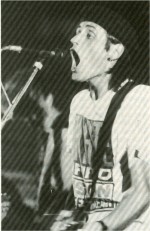 The comparison with Ray Davies is more than simply American journalese for 'London-based British band'. It also stressed Edwards' attitude to songwriting. Like Davies before him, Edwards prefers the role of observer to that of participant. This aloofness has been present throughout Jesus Jones' songs from the time of Info Freako: "It's me singing in the first person but I suppose I mean the third person" and has culminated in Right Here, Right Now which, while dealing with events in the Eastern bloc, is taken from the point of view of someone watching them as they unfold on the television. As mentioned before, Iain Baker has described the songs as being without humanity and it is true that they seem to lack any heartfelt emotion. It must be remembered, however, that Ray Davies' thumb-nail sketches gave way to the bleak compassion of his best work only after The Kinks (another jackdaw band) fell from the peak of their popularity and had the freedom to do as they pleased, away from the public expectations. If Edwards grows as a lyricist while remaining commercially successful then this will be a military campaign well worth recording. Right Here, Right Now, Watching The World Wake Up From History".
The comparison with Ray Davies is more than simply American journalese for 'London-based British band'. It also stressed Edwards' attitude to songwriting. Like Davies before him, Edwards prefers the role of observer to that of participant. This aloofness has been present throughout Jesus Jones' songs from the time of Info Freako: "It's me singing in the first person but I suppose I mean the third person" and has culminated in Right Here, Right Now which, while dealing with events in the Eastern bloc, is taken from the point of view of someone watching them as they unfold on the television. As mentioned before, Iain Baker has described the songs as being without humanity and it is true that they seem to lack any heartfelt emotion. It must be remembered, however, that Ray Davies' thumb-nail sketches gave way to the bleak compassion of his best work only after The Kinks (another jackdaw band) fell from the peak of their popularity and had the freedom to do as they pleased, away from the public expectations. If Edwards grows as a lyricist while remaining commercially successful then this will be a military campaign well worth recording. Right Here, Right Now, Watching The World Wake Up From History".
Jesus Jones are a pop band. While that may appear crassly obvious at this stage in the article it is important to note as it means they presently occupy territory that is notoriously difficult to defend, based as it is on the necessarily changing requirements of fashion. Which leads to the question: "What future for Jesus Jones?" This is a young band which has found fame extraordinarily quickly, partly as a result of good timing, partly because of the unique efforts of one individual. Metaphor apart, however, a band is not a military unit and it is possible to envisage the other members becoming tired of his dominance and walking out. Possible. Perhaps that is being too pessimistic; after all, Edwards, Gen, and Al Jaworski have worked together for the larger part of a decade and Gen is an old school-mate of Edwards'. These are strong bonds.
In the meantime, Edwards is more than aware of the need for constant change. The swapping of interminable aliases is an indication of that, as is the shift in Edwards' public persona. From the moody Jesus H. Jones to the forthcoming Mike Edwards, he has shown himself to be an adept manipulator of the press, like Lennon, Jagger, and Morrison (Jim not Van) before him. However, he knows that the downfall of, say, The Doors was the fact that they were caught in the public's imagination as a "1967 thing" and that Jesus Jones needs to avoid becoming another "Early '90s thing".
That Edwards recognises the limiting aspects of public expection is evident from the deliberate contrast between Info Freako and Never Enough. To change and remain identifiably the same is a difficult juggling act, especially when your identity is based so heavily on other influences. He claims to already have strong ideas about their next "radically different" album, hinting at world - and Eastern - music influences, and so it would appear that a distillation of his overall control to something more democratic is unlikely for now. Or perhaps it has already happened. Perhaps all this talk of his Machiavellian tendancies is little more than another press smoke-screen. With a band so full of apparent contradictions - Edwards at once assuming total dominance and espousing the joys of being in a band - anything is possible. Whether they create a lasting future for themselves or are instead consigned to the bargain bucket of nostalgia remains to be seen. One thing is certain. At the moment, Jesus Jones are riding tall, proudly wearing their laurels of fame, their spoils of war.
An early 90s thing? Sure, right here, right now.
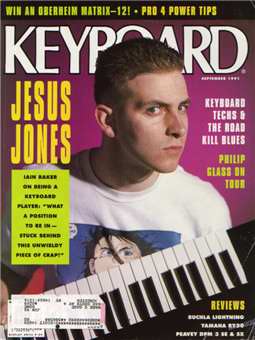
September 1991 MTV Awards
Jesus Jones took home the statuette for Best New Artist.
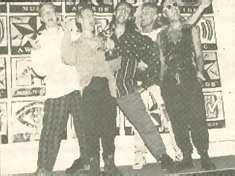
Review of Gig at The Warfield, San Francisco September 8th 1991 - Sounds - circa September 1991
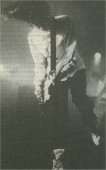
Mike Edwards
stands centre-stage for his first encore and studies the assembled San Franciscan crowd. Pondering his journey from the clubs of London to the charts of America, he wonders if they really, genuinely, like him. "So," he asks nervously, "was it worth it?". The crowd leave him in no doubt as to their feelings on the subject, and he's touched. "I just wanted to know," he says, "it's good to make sure".
You can almost understand his worries. Without ever really seeming the Band Most Likely To, Jesus Jones have along with EMF, scaled heights far beyond expectations. The Warfield isn't a giant venue by anyone's standards, but , as a local informs me, it's the sort of place for the up and coming and/or the down and going, a fact amply demonstrated by the list of forthcoming attractions: Crosby Stills & Nash, The Pogues, Front 242 and Lenny Kravitz.
Tonight, however, The Warfield belongs to Jesus Jones. Packed with Americans well versed in the Jesus Jones book of cool, shaved heads (sides only) and floppy fringes (blond optional) leap from the stage as the band tear through what's already sounding like a greatest hits collection. "Right Here, Right Now", "International Bright Young Thing" and "Real Real Real" are all pelted out with renewed enthusiasm, and even out here everyone's singing along to every word.
Whether Jesus Jones will be back at The Warfield or playing the Amphitheatre on their next visit to 'Frisco (coming attractions: Rod Stewart, Paul Simon, Sting) is anyone's guess. Mine is that even with their newly acquired MTV award, Mike and the boys will have to play a few more US Rock games if they want to seriously compete with the big boys. Personally, I hope they don't bother.
Poster for Gig at Ann Arbor Hill Auditorium September 21st 1991
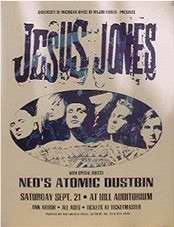
Review of gig at Orpheum - Website The Tech - October 1991
Jesus Jones brings electric charge to Orpheum
JESUS JONES With Ned's Atomic Dustbin. Orpheum Theater, Oct. 10, 7:30 pm.
By SANDE CHEN and ALBERT LAU
FOR THOSE OF YOU WHO COULDN'T bear to tear yourselves away from your late-night
tooling sessions, you missed a great double bill with Jesus Jones and Ned's
Atomic Dustbin at the Orpheum. From the start, the atmosphere was charged, the
audience was psyched, and it sure beat doing a problem set. The sold-out show
began promptly at 7:30 pm with the opening act, Ned's Atomic Dustbin. The wildly
appreciative and jubilant crowd were already on their feet. An hour-long run
through God Fodder, Ned's debut album, was more than enough to get them going.
Ned's breezed through "Less Than Useful," "Until You Find Out," "Kill Your Television"
and "Cut Up" -- or as lead singer John called it, "the Stomp-Your-Feet-Until-They-Hurt
Dance"-- with head-churning intensity and little interruption. Their first single,
"Happy," generated much adoration and applause. After "Throwing Things" and
"Grey Cells Green," Ned's announced a "short encore" which went on for some
time. Finally, they played the well-received "Selfish" and departed one-by-one
to the line "Get off of that stage," from the song "What Gives My Son?" The
main attraction for the night, however, was definitely Jesus Jones. The band
was as wildly out of control on stage as Ned's Atomic Dustbin. They didn't play
as fast as expected, but still were very energetic and intense. Jesus Jones
opened with the frenetic, discordant sounds of their debut album Liquidizer
and garnered a great response from the crowd. They also played "Move Mountains,"
"Never Enough" and "The Real World" from the same album. It was evident, however,
that Jesus Jones' second album, Doubt, was the more well-known of the two. Their
three Top 40 hits, "International Bright Young Thing," "Right Here Right Now"
and the current "Real Real Real" produced an audible audience chorus. Other
songs on Doubt were also enthusiastically received, with extra emphasis on "Welcome
Back Victoria" and "Are You Satisfied?" Despite lead singer Mike Edwards' comment
"Never trust an audience that stands up for Jesus Jones," the crowd not only
stood up but thoroughly enjoyed themselves, too. Jesus Jones played their encore
faster and with even more energy. After a short reminiscence on their earlier
performance at the Orpheum, they launched into "Blissed." Midway through the
song, Edwards stepped off the stage into the audience. Waving arms obscured
his legs as he walked around the front of the stage, and thunderous cheers filled
the theater as the band left the stage and the final chords of "Blissed" disappeared.
Copyright 1991 by The Tech. All rights reserved.
This story was originally published on Tuesday, October 22, 1991. Volume 111,
Number 44 The story was printed on page 11. This article may be freely distributed
electronically, provided it is distributed in its entirety and includes this
notice, but may not be reprinted without the express written permission of The
Tech. Write to archive@the-tech.mit.edu
for additional details.
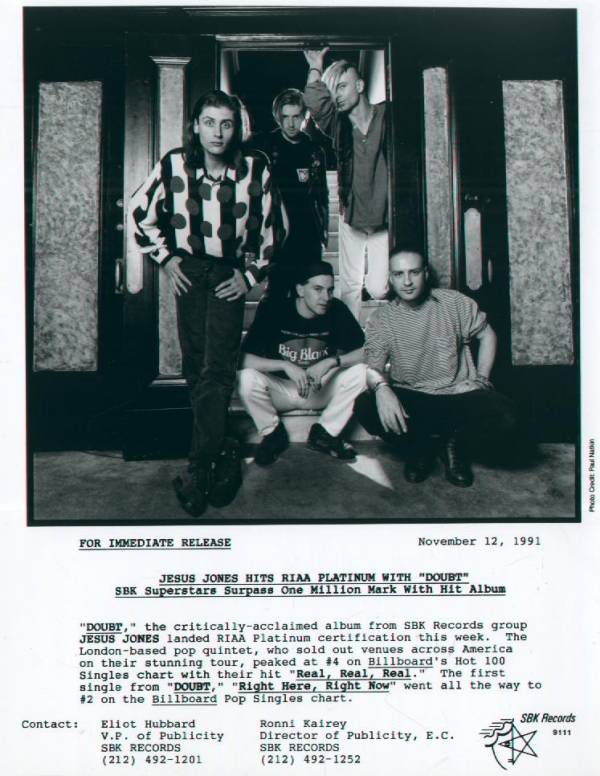
Interview - Melody Maker - 7th December 1991
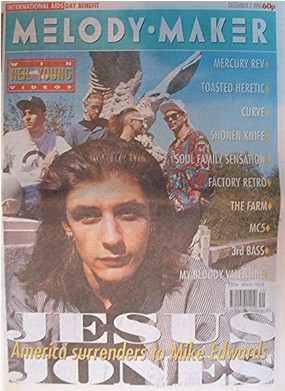
America
does some strange things to people, especially when they've been touring
there for months. They get wrecked. They get exhausted. They get ill.
Homesick. Depressed. Thin.
Mike Edwards orders salad for lunch in a Manhattan restaurant and radiates
health and happiness. He's been travelling these States for eight weeks
solid, but his fresh-faced affability seems more like that of a man
just back from a particularly relaxing holiday. He hasn't missed anything
about England apart from his wife. He has emerged unscathed from the
whole perilous process, except for one small thing.
"Some of my dreams have been incredibly violent," he volunteers.
"I never had these sort of dreams very often before. They began
on this tour. And some of them were well before I started reading 'American
Psycho'."
"I had one particularly nasty dream where I'm being chased by a
group of zombie types, and I discover that the only one way to kill
them is to ram something sharp through the eyeball into the brain. I
despatch two of them in that manner, and I'm wrestling with the third.
I have to break his arm, take out one of the bones and ram that through
his eye. I was perfectly satisfied with it; it didn't seem abnormal."
"I beat Jerry (Jesus Jones' guitarist) to death with a guitar in
another dream. I think that's symbolic of my perfectionism. Then there
was the one where I had Freddie Krueger things at the end of each limb,
so I could employ karate with them. I could almost take out someone's
stomach."
"I had another dream where I was a hired killer. I was hired to
act in a random, almost psychopathic way."
Do you ever have any sweet dreams, Mike?
"One morning, I woke up laughing. I had a dream I was playing tennis
with herbal teabags. The teabag would disappear into the void, and then
it would get returned. I can't remember who I was playing with."
That Mike manages to find enough sleep to have dreams, never mind remember
them, is something of an achievement: he's lately become an insomniac,
although this is more to do with his famous world domination plan than
the fact he happens to be touring the States.
"I'm so obsessed with the next album it takes me five hours tro
get to sleep every night," he confides. "I spend all my time
thinking about it. I never switch off. I'm usually in the hotel at four
or five in the morning writing bits for it while the others' drunken
sprees are going on."
"It's the first thing I think about when I wake up, what it should
do, what it should be about, how I can make sure it's about that, the
mechanics of making it. The first day I get home, I'll set all the stuff
up and I'll start the album. I'll feel compelled to."
You wouldn't be suffering from third album nerves?
"Quite the opposite. As long as we just have fun and experiment,
things should be okay. I think it will be the first rock album of the
Nineties. It should reflect the society we live in. That's the role
of rock music. No one, apart from the people in House music, recognises
that it's an incredibly technological society we live in. Most people
come across some sort of computer when they go into work, they pick
up a phone - rock music still hasn't reflected that. It's time to take
the techniques of House music and make rock music with them."
"It won't be a dreary, retrogressive return to the Seventies. There's
a new type of music waiting to be made, and Jesus Jones are the type
of band who should be trying to do it."
"Having said all that, the music almost inevitably goes along its
own course. I struggle along behind it, vainly trying to steer it in
a direction. I often start with a clear idea of what it should be and
it follows its own course relentlessly. But I think this album will
say more about us than the others have. It will be the closest to giving
the exact picture of what we're about."
Despite having spent a third of this year, in total, touring America,
Mike still insists that there will be no road maps on the next LP; just
some enlightenment.
"I'll hope to draw on the experience of travelling the world, what
I think it brought me and what I think other people can relate to."
"I've been inspired be travelling. I get an incredible nervous
energy and adrenalin just by being in places like Chicago and St Louis,
Missouri. These places have romantic connotations, and the thrill of
that inspires me to write. I find being on tour a very creative time
because of that excitement and because of the leisure time we have,
time to read books, to listen to music, to explore academic interest,
to think about things."
"It's an invigorating lifestyle. If it wasn't for the fact that
my wife lives in England at the moment, I could tour forever."
Mike Edwards' fixation with the next Jesus Jones' LP is probably enough
to put the fear of God into the rest of the group.
As their self-appointed leader and dictator, one who believes that
anything less than excellence is intolerable, Mike himself cheerfully
agrees that the imminent recording sessions and rehearsal might find
him turning, once again, into an absolute bastard.
"I haven't been a tyrant for some time," he reflects. "Not
for a few months. On our last American tour, things weren't going well.
I found I was getting very stressed and angry. I'd be doing three or
four radio interviews a day and the first question every single time
would be, 'How did you get your name?' It makes you want to kill anybody
and everybody. High stress situations bring out the worst in me."
"This tour is a lot easier. There's less pressure this time. Iain
(insane keyboard player) is doing more interviews. We've been playing
all these songs now for 18 months, so we can get on and do it. The band
have never got on better. It's the friendliest, happiest tour we've
ever done."
"That'll change when it comes to learning the new songs for the
album. Mike the tyrant will return, undoubtedly. It's always when I
want to drive people to greater heights, when I expect more from people,
when they're being too easy on themselves and not doing what I expect
them to do, or not doing justice to the songs. It's because I'm a perfectionist
that I turn into a tyrant."
Are you tyrannical onstage, too?
"Yes, for example, when people don't end songs on time. I'd scream
at them onstage, or wander over and make very sarcastic comments, or
issue instructions, but never in an obvious way so the audience would
know. If you ever see one of those moments where I wonder over to Al
(bass player) or to Jerry, there's usually something very unpleasant
happening."
Do they always forgive you?
"Probably. Oh, probably not, actually. I'm sure they get fed up,
but they haven't got fed up with the success so far. There was a crucial
moment when we were on this beach in Spain and I said, 'I know how we
can succeed, but what you have to do is give me complete control'. Two
weeks later, we went in and did the 'Info Freako' demo."
"What I create is out of conflict. The old cliché about great bands
existing in a state of conflict is very true. When we're learning the
new songs for the beginning of the British tour, there will be moments
of great conflict but it's important they have to happen because otherwise
we won't be as great as I think we should be."
Can you always justify it?
"My tyranny is probably a bad habit because, in retrospect, it's
not a very human way of treating people, it doesn't endear you to people."
Mike has long held a reputation for not-very-human behaviour.
"I'm still monk-like and solitary. I've never been that interested
in drink and drugs. I'm not a very gregarious person. I provide the
dry-as-a-bone information and the rest of the band provide the humanity.
Jesus Jones is a bit like 'Star Trek'. I'm the strange mix of Mr Spock
and Captain Kirk, the Vulcan logic and everything. 'You want to go out
and drink? That's illogical'."
As 1991 draws to a close, Mike Edwards has every reason to be satisfied
with his progress towards world domination, especially in the USA. It's
been the year which has seen Jesus Jones move from the relative obscurity
of "alternative" status right into the mainstream of American
pop.
There have been smash hit singles with "Right Here, Right Now"
and "Real, Real Real"; a gold, going-on-platinum, LP in "Doubt";
regular appearances on MTV (and on television shows with huge ratings
such as "Entertainment USA") and an encouraging amount of
off-duty personal recognition.
Australia and Japan are very healthy", Canada gave "Doubt"
gold sales and so did Britain, where "International Bright Young
Thing" was a Top 10 single. Mike finds it "hugely satisfying"
that the Joneses have comprehensively proved themselves in their home
country, but feels "incredibly sad" that it took their considerable
American success to earn any serious credibility in the UK.
Nevertheless: "We've laid the foundations for being the biggest
band in the world. It would be very easy to relax with this measure
of success, to think we've achieved things most other bands may never
do, but it's still not enough. Realistically, probably nothing will
be enough.
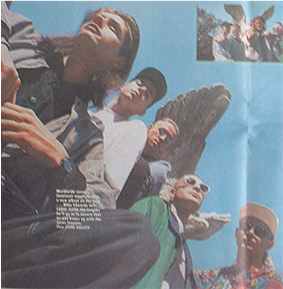 "There
are certain targets, and other people set the standards to be beaten.
For example, if Vanilla Ice sells seven million copies of his album,
it would be great for us to sell eight million."
"There
are certain targets, and other people set the standards to be beaten.
For example, if Vanilla Ice sells seven million copies of his album,
it would be great for us to sell eight million."
"I've no idea how long it will take to achieve the monumental success
we want. The worst thing ever would be to be like Duran Duran - 'By
the end of this year...' That would take away the enjoyment because
the opportunity of failure would be everpresent and life would be a
series of disappointments."
What's the greatest peak of success you can imagine at the moment?
"For Jesus Jones to be thought of by the world in general as having
changed rock music, as having been important players in the great game
of rock history, as having changed the way people thought about what
rock music could achieve, and on our own terms as well."
And Mike, of course, will be the by-no-means-reluctant star at the centre
of it all.
"I'm not afraid of that."
What is your definition of a star?
"It's inherent. It's not worked at or worked for. Which is why
I disagree with Madonna and why I would include Prince. Stardom is more
emotive than logical, or, at least, it's a crucuial collision between
the two."
"Jimi Hendrix and Janis Joplin were stars because, I think, they
were dominated by the artisitic side rather than the logical side, which
made the expression of their art so much clearer, so much easier to
communicate. You don't have to be dead to be a great star, but perhaps,
it does add to the legend."
"Miles Hunt...if they (The Wonder Stuff) started doing stadia in
America, Miles would be a star, although he'd probably hate me for saying
that."
Anybody else among your contemporaries?
"Ian Brown, in a very Jim Morrison vein, in the sort of way that
the less he says, the better it is for him. Nothing against his intellect,
but there's a certain air he has. The way he appears in pictures does
more for him than his own words, even if he had a degree from a university
or if he spent three years down-an-out in the streets of New York."
Rather at odds with the usual concept of touch-me-not superstardom is
Mike's conviction that he should be accessible to his audiences. In
the live show, for instance, he ventures out to the lip of the stage
during "Blissed" and sits on a monitor, gazing into the front
rows.
"What it's about is actually having a look at the audience and
saying hello personally." he explains. "It's a sort of conceptual
thing, 'Blissed', as happy as you can be, completely relaxed. It's cretinously
simple to stand there in front of people and smile at them, but it says
more than anything in the words can. I think it's important to use whatever
gifts you have as a performer."
"You see ecstatic faces, they scream...a lot of people can't believe
it. I think the more famous you get, the more enjoyable for me and the
audience to do those sort of things because people get a glimpse of
humanity. Being a star is well and good and I, as ever, aspire to that,
but I think a bit of humanity makes people feel good about themselves.
It makes the evening special. That's what I'm trying to do with the
audience, get some of them and give them some of me."
And so we're back to that word again, but this time, he finally admits
it: there is a spark of humanity in there after all. I thought as much.
And as if to prove it, Mike Edwards breaks one of his self-confessed
golden rules: he takes us to a bar and buys a round of beers. One day
this bottle will be worth a fortune.
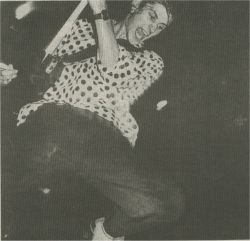
Interview - Melody Maker - 21st/28th December 1991
Ah, Christmas. What a very special time of year it is. A time to forget work, put aside study, banish your problems and concentrate on the real meaning of life. The very reason why we're here to walk the planet and why the spark of life was breathed into our earthly form. Yes, it's time to pray to that most holy of God-given things: the gadget. And, if Christmas isn't the perfect time to blag as many of the tiny, black, LED-laden, button-blessed wonders off the family as possible, then when is? Forget the socks gran, get a load of this little lot.
This is the nineties, and what use is a shopping trolley full of gold, frankincense and myrrh for a modern day Jesus? Ever tried plugging a myrrh into your Marshall? Neither's Mike Edwards. But gadgets on the other hand...
"Gadgets in general I'm a big fan of," he admits. "Things like Game Boys, a few mountain bike all-in-one tool kits...that's the sort of thing I love. I think most people love them, actually. Some sort of wean themselves off it as they get into adult-hood, thinking it's no longer mature to have a fascination with little gimmicky things. But I love them."
And so it was that we came bearing gifts - a bag full (and the rest) of small wonders for the guitar player in your life. And first out of the stocking? Jim Dunlop strap lock, £7.99.
"Strap locks are the little gadget that we find essential," reckons Mike. "Before the strap lock I was always amazed that people on 'Top Of The Pops' would be standing there and they'd take their hands off of their guitar and it would stay on. I always thought 'How do they do that?', and thought it must just be pop star charisma that makes a guitar stick on."
So they're worth the £8?
"Absolutely, worth every penny. An absolute must, an essential Christmas buy for anyone who plays gigs, especially as it 'rotates for fast moves'. I wish I could say the same for our guitarist."
A quick fumble with the wrapping paper, and we're face to face with the Guitool: all those handy screwdrivers, Allen keys and 'things' in one compact unit. To you, 15 quid.
"Yes, that's pretty good for guitarists and mountain bikers. There's lots of popular Allen-key sizes, pretty good - I could go for that definitely. Mind you, all the little bits bought separately probably wouldn't amount to more than about £7. And it's very dodgy getting through customs with a thing like that."
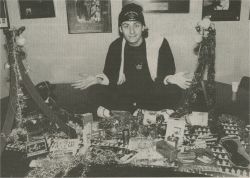 But not with the handy Matrix acoustic guitar tuner pick-up by Kamen. Stick the sucker on your acoustic and you can plug it straight into a tuner rather than trying to use the tuner's bult-in mic. £15 a bit steep?
But not with the handy Matrix acoustic guitar tuner pick-up by Kamen. Stick the sucker on your acoustic and you can plug it straight into a tuner rather than trying to use the tuner's bult-in mic. £15 a bit steep?
"Yes - it also seems like an incredible waste of time, actually, but my immediate thought is that I wonder if you can use this as a transducing pick-up anyhow. Presumably, because of the way it plugs on, it's not going to be a very good sound."
Not as good a sound as a genuine JHS acoustic guitar pick-up that suspends itself over your soundhole, for example. And just £8.95, too.
"That looks great - I could definitely go for one of those for my 12-string. At the moment I just use a microphone, but, to be honest, I don't really use a 12-string as lot, mainly just when I'm writing. I have in the back of my mind the thought that one day I will need one of these, and that's the essential way of thinking for a gadget fiend; that one day you might need this, not that you actually need them at all."
More immediately essential for the Edwards stocking, however, is a guitar tuner. For example, the Boss TU6 - just £30.
"Yes, I think our guitar roadie has one of these. We don't actually use one - we use the Arion stage tuners that have the little light that flashes to tell you if you're in tune or not. It's very handy if you're playing in some dingy club or something. It's like a footpedal and you just plonk it with the rest of them. It's a lot better than having to watch the little needle."
Though some people prefer the VU needle because you can see when you're getting near to being in time.
"Well, the best we ever come on stage is being nearly in tune anyway. I think there are a lot of professional guitarists in the industry who cannot tune their guitars by ear, so this is essential. It's actually guitar tuners that keep the world of rock music going."
The Tanglewood one is only £22.50.
"£22.50 to keep the world of rock music going - it's a bargain."
And, talking of which, just £11 to save your ears from total deafness, courtesy of the North Sonic II shooting ear plug. These plugs leave your ears alone for most of the time, but, when they recognise a dangerous peak, a valve shuts, blocking out those dangerous dBs.
"Hi-tech ear plugs - that's really quite impressive. I've never really wanted to wear ear plugs apart from particular gigs. The one place in particular is a club in Washington DC that, in my experience, is the worst sound ever. I would have liked to have worn earplugs at that gig. I probably will be deaf by the time I'm 40, but I think it will worry me more at the time. Generally, I want the volume. Maybe I'd wear them if someone bought them for me for Christmas, though I'd worry a little about looking like you're a related to a Dalek."
No such problem wuith the Pickers Palo capo, £7.90.
"Capos? I say sod 'em - make the bastard sing higher. I've never used one, mostly because I can never be bothered to relearn all the guitar shapes. I find it very disconcerting. Also, for us, I tend to write guitar parts to fit the song, For me, the guitar parts are more important than the actual structure of the song, and I write within the limitations of playing it at the normal pitch, so we've never used capos at all.
"But this one, if I was going to use one, looks quite good - a little like the ones Ned's Atomic Dustbin use. They use these things that look like clothes pegs, but this one looks a little more effective. Hmm, a long plastic handle, looks kind of suspicious - looks like it could break off pretty easily, especially playing live. Everything breaks off pretty easily playing live. I can't get emotionally involved with this, I'm afraid."
How about with strings. Feel any romance for these DR handwound bass strings?
"They've got Low Riders Funk written on the packet..."
Enough to put you off?
"I think it is actually. Mind you, £8.50 is very cheap for a set of bass strings."
How about these Maxima gold guitar strings. Just a flicker of affection for them?
"They're very pretty, so I think I'd try them out for...what? £9?!? Wow, a very good reason not to buy them - they'd have to be quite spectacularly wonderful and very unusual to be worth paying that much money for. But the gold colour is very Christmassy - if you don't like them, you can always go and hang Christmas decorations off them."
How about hanging a guitar off this Bear leather guitar strap?
"Here is one item I would almost certainly not use, because most guitar straps are made for people who worship Haircut 100 and are under 5' 5". What I have to do for guitar straps is go to a car breaker's down the road and cut the seat belts out of the cars. All my guitar straps are made from car seat belts because you cannot buy a decent length guitar strap in a shop anymore and this one's no different. I mean, look at this..."
You would look a bit Mark King.
"Exactly, and I do not want to look a bit Mark King."
So, not worth the £15.99?
"Not unless you're some sort of midget. If Prince wanted to play a guitar quite high he'd be all right with this guitar strap."
Time to move on - leads. This Solex lead is £12.95 and has a switch on the jack so that things stay nice and quiet until it's plugged in. You like?
"I haven't seen anything like that before and it definitely appeals to the gadgety side of me automatically. The one thing with leads that I've found in the past is that you could spend £15 on an amazing guitar lead, or £5 on one that lasts three times as long, and they all wear out just as quickly. I really don't think it's worth paying a great deal of money for an expensive one."
What about Whirlwind's lifetime guaranteed ones?
"It Whirlwind have got a lifetime guarantee, I don't think they've ever seen us play live."
Jesus Jones don't have to worry about leads, of course - they've gone wireless.
"Yes, we did that a long time ago, precisely because of leads going down all the time. We're using a Shure system, which is excellent. We've had no problem with interference - though you still hear tales of the Spinal Tap situation. We played in Washington the night after Anthrax did at the same venue, and their guitarist had a radio cab going through the PA for a large amount of the gig."
How about some apres-gig reading, like The Ultimate Guitar Book - £15's worth of pretty colour pictures of guitars.
"From the outset, having seen this lying on the table earlier, I was hoping to dismiss it as being only for guitar bores, but it is actually sort of fascinating to see something like Dave Hill's Superyob guitar. You have to be a complete and utter guitar fanatic to want a book like this. If you are, it's a perfect Christmas spresent. I'm not sure I could be bothered with it, though. I think I'd rather play it to be honest."
Talking of which - what is the preferred Edwards axe?
" A Fender Tele - a new one. I have no great reverence for guitars. The Fender Telecaster, in general, I'm quite keen on though - to me, it is the ultimate electric guitar. I think it looks the best, and it's also very easy to repair, which comes high on our list of priorities. We do tend to get through equipment - I've smashed guitars in fits of pique, and we've had to surgically remove machineheads from our bass player's face."
But never had to remove a Hohner harmonica holder from his neck. This Neil Young-style holder is the sort of thing that clamps over your shoulders and places a harmonica in a position that enables the wearer to make music by merely breathing. A bargain at £6.95?
"I've never used one of these- - I'm not the folk singer type, to be honest. I'd rather sample a harmonica than be bothered to learn how to play it. Mind you, to have a sampler wrapped around your neck you'd have to have something more stout that this. I suppose, yes, if you do want to bug the shit out of people on the London Underground, then this must be the perfect thing to do it with. Not for me though."
Neither is the Hariba string winder, which at £1.99 for saving hours of machinehead turning, I'd have thought pretty useful. Not so Mike.
"Our guitar roadie swears by these and loves them, and I think they're a complete and utter waste of time."
But you don't have to string your own guitars.
"True, I don't re-string them a lot, but I'm writing the album at home on my own at the moment, and all the string changes I'm doing myself. I've never used these things because I've always thought they were too gimmicky. With gimmicks there has to be a large element of the gratuitous, but there is a line and if you go too far over that line you end up with string winders. They're just the other side of gratuitous.
"However, Fast Fret (next out the bag, a polish on a wooden stick for keeping your guitar neck slippery - just £4.99) is great. You spend 10 minutes rubbing this up and down the guitar neck and feel you've actually done something worthwhile, when you haven't really. If you sweat a hell of a lot on stage, as we do, you have to have something that cleans guitars and makes it feel nice the next time you pick it up. I'd definately go for that."
How about the Fender Instant Play Starter Pack? £11.95 buys you a tuition book, cassette system, plectrum, strings and tuning pitch pipes.
"As a self-taught guitarist I'm very wary of things like beginner's rock guitar cassettes. I think the rest of it, well...it's nice to know what the chords are by looking them up in a book the pitch things are quite useful, even now, and the rest of the stuff - plectrums and strings - are pretty essential. I'd do without the cassette, the rest of it's not bad and £11 is not bad at all. You can always tape over the cassette."
As you could with the Steve Morse Power Lines video (about £20), and the Viv Lock cassette and tutor, £12.
"I once got a book that showed you a load of chords, and that was very interesting and it was well worthwhile. I think it probably saved me about six months of hard slog, but everything else, even lead guitar things, I taught myself. Even unusual chords you end up finding out for yourself. I think it's better to be genuinely interested in music and try and imitate other players. Buy a John Lee Hooker tape and try and play like that. I think a video on how to play the guitar is a total waste of time. I can think of nothing less conducive to either watching television or playing guitar than a video about both."
But you haven't heard the incessant ticking of the mini-metronome yet, just £20.
"It's called the Pacemaker - how tasteful."
Ever felt the need for a metronome?
"Absolutely never. I think it's more important for classical musicians. I know my father used to play classical acoustic guitar, and he used a metronome quite a lot. I can think of no reason whatsoever for having one - you have your own internal metronome. The other side of gratuitous again."
What about a Picatto blues bottleneck - just £1.99? Ever used one?
"Yes, I have, but never on record - only when I'm trying to play guitar like John Lee Hooker, though I never quite manage it. They're kind of fun...a true gadget you might need one day."
As any serious guitar player may feel about Mega Designs' custom made replacement guitar knobs. Made from lead-free pewter, shapes such as lips, skulls, pyramids, claws, monkeys, flies, muppets and strawberries are available to fit any guitar at just £9.95 (inc p&p) a piece.
"Oh yes...wonderful. Is that supposed to be a piece of chocolate? Oh no, it's a head. I really like these. A lot of people want to customise their guitars amd make them a little special, make them theirs, and I think it is a hilarious way to do it. I'd like a guitar covered in lips. Great gadgets - not essential in the slightest, but good fun."
Or maybe for the roadie in your life, you'd prefer a Fender Tee-Shirt, or something similar. £14 (phew!), but would you ever be seen in one?
"No, quite frankly. I play one of their guitars, and I think that's as much endorsement as they need from me, really. I can see no point in wearing one of these whatsoever. Though I think they're mandatory if you work in a guitar shop."
Almost as mandatory as a guitar case for a guitarist. Rhino's gigbag, with a front pouch for your spare pewter lips, is £29.
"I have resorted to using these on occasions. These are well worthwhile, but only for when you're hopping on the bus to go to rehearsals, not if you're getting in the back of a van and chucking your guitar in, or if you're flying anywhere. They're normally a hell of a lot cheaper than hard cases. I think £29 is a bit steep though."
But not too much for a guitar stand.
Arbiter's, at just £25, looked quiet hard wearing, but felt a bit wobbly.
"Ah - the 'Terminator II' of guitar stands. We've got to the stage where we think guitar stands are essential. £25 - not bad. It does seem a little disconcertingly mobile. I think guitar stands are a great gadget - the sort of thing that's useful to have around, vaguely. This one's okay."
How about the Ultimate, a very lightweight, smashingly hi-tech looking contraption that folds completely flat with no bits sticking out? Do I hear £30?
"Now, this one I like. I wouldn't like to put my 12-string on it because it doesn't look quite wide enough at the bottom, though the locking idea at the top is excellent. It's very unusual looking, and, therefore, has the ultimate gadget appeal. And it weighs practically nothing - which for a guitar stand that's going to just sit there is quite meaningless - but it does add to its gadget appeal. Plus it does pack completely flat - I like that a lot. Well worth the extra fiver for that one."
So, surveying the damage...anything essential, or is it all the rock 'n' roll equivalent of another pair of M&S sock?
"I think it would have to be the tuner that's essential - good price, very useful."
And what would you buy the guitarist in your band out of this lot?
"Oh, the tuner again, definately. Absolutely essential!"
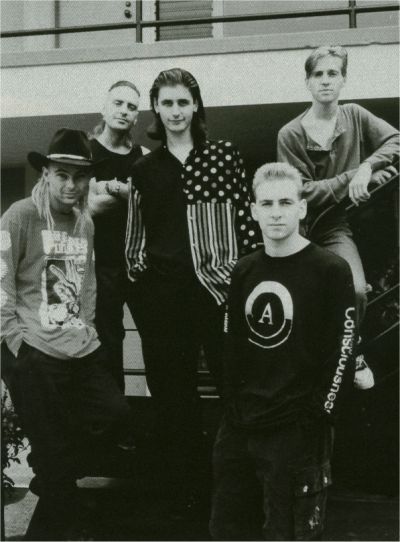
Interview - Bizz (Brazilian Pop Magazine - 1991
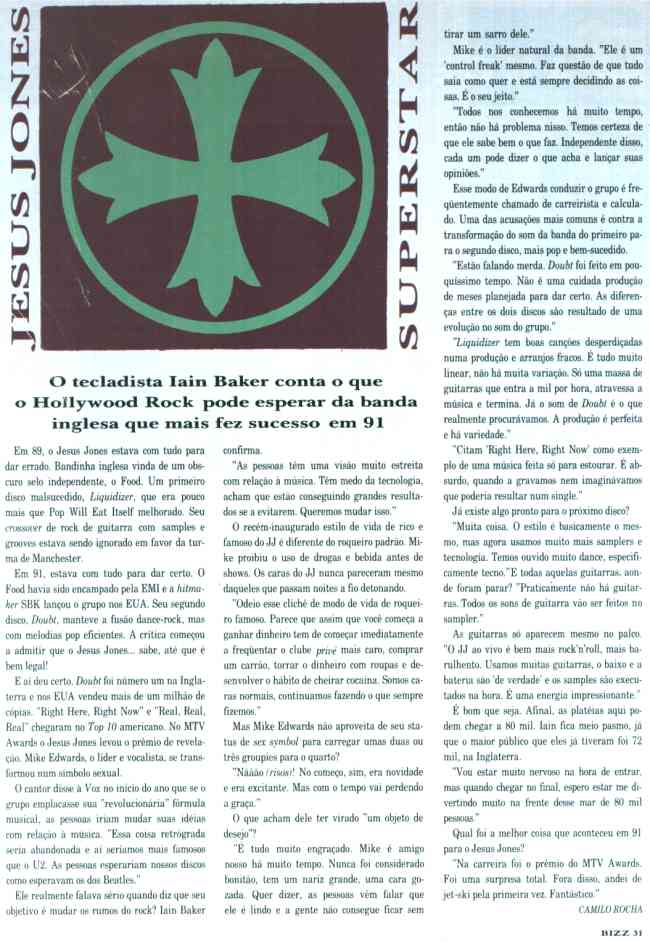
Interview - Fama (Brazilian Pop Magazine - 1991
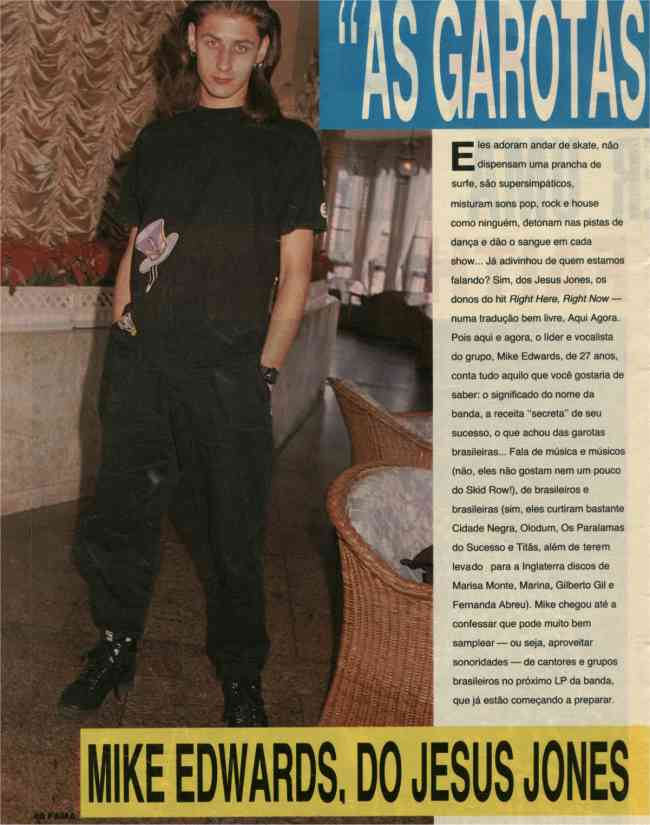
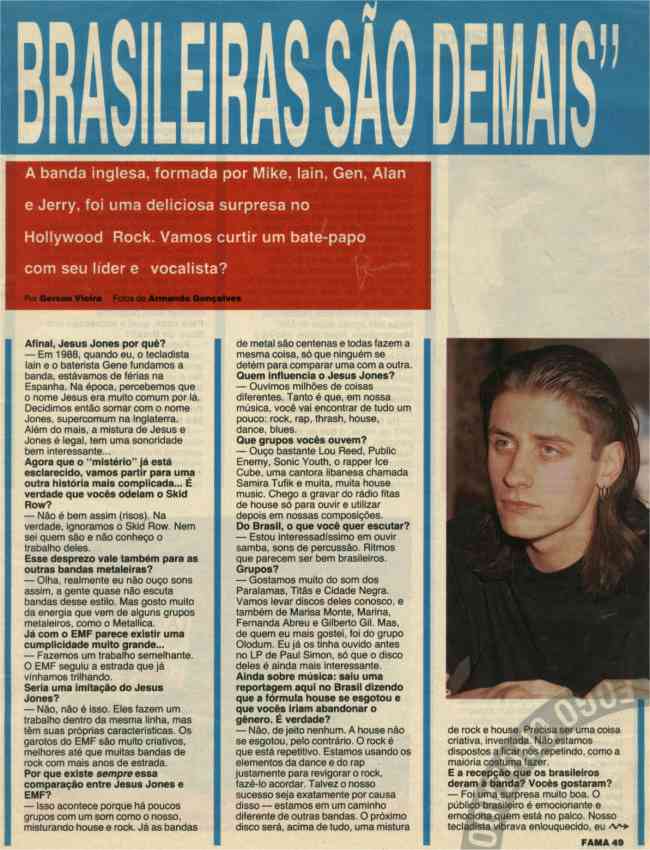
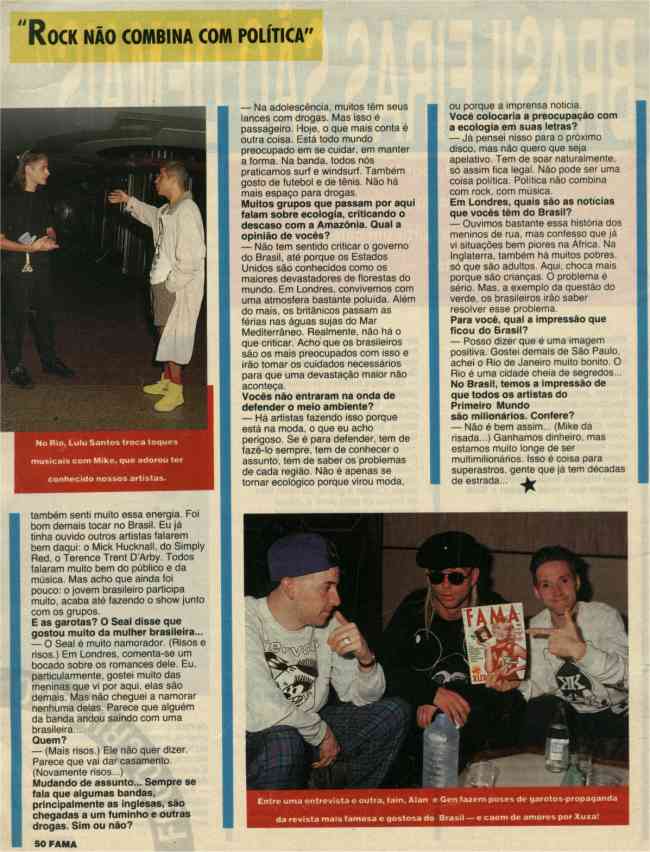
Interview - Melody Maker - 21st/28th December 1991
 "I don't want us to be purely an indie band. I'm far too ambitious to be satisfied with that and I'd make a far better pop star than most. As fas as the Joneses go, it's us or Howard, and you and I both know there's no competition."
"I don't want us to be purely an indie band. I'm far too ambitious to be satisfied with that and I'd make a far better pop star than most. As fas as the Joneses go, it's us or Howard, and you and I both know there's no competition."
That was Mike Edwards back in March 1989, when his band's low-budget and high-explosive debut, "Info Freako", had made an auspicious impact in the lower reaches of the Top 40. At the time, few gave much credence to this sneering upstart's claims of imminent and enormous fame. If ever a band had "One-idea-one-minor-hit-wonder" writ large all over them, here they surely were.
Well, funny we should say that (and we did, often). When we caught up with Mike in a Salt Lake City hotel restaurant in July, they'd had a Top 10 single ("International Bright Young Thing") and a Number One album ("Doubt") in the UK, and Mike was to be heard discoursing knowledgably on the divergence in groupie culture from America to Japan to Romania - and enjoying his first taste of US Top 10 success, with "Right Here Right Now", almost as much as the Utah scenery.
Since then, "Real Real Real" has also gone close to the top in America and "Dubt" has cleared the million mark. Jesus Jones were clearly a band whose time had arrived. With Mike last heard suggesting, with characteristic modesty, that the third long player, due Aprilish, will be "the first rock album of the Nineties", the continued ascension of Jesus Jones looks to be a course charted in whens rather than ifs: "We've laid the foundations for being the biggest band in the world. It would be very easy to relax with this measure of success, but it's still not enough. Realistically, probably nothing will be enough." Christ.
